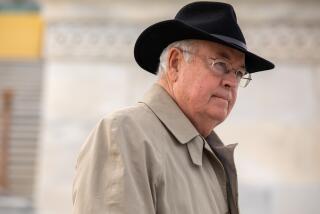Starr’s Indiscriminate Net
- Share via
Independent counsel Kenneth W. Starr wants the Supreme Court to rule that the confidentiality that exists between lawyer and client should end with the client’s death. Otherwise, he contends, “the search for the truth” in criminal cases could be frustrated. Most of the justices who heard that claim during arguments this week seemed reluctant to circumscribe what has been a virtually absolute privilege. So they should be. The court, which could rule in a few weeks, ought to be wary indeed about adopting any new standard that would limit or reinterpret a right that has existed unchallenged for generations.
The Holy Grail that is the object of Starr’s quest consists of three pages of notes made in 1993 by James Hamilton, the lawyer for White House counsel Vincent Foster. Nine days after that privileged conversation, Foster killed himself. Starr hopes to learn whether Hamilton’s notes indicate that Hillary Rodham Clinton or others lied when questioned about the firing of seven White House travel office employees early in Bill Clinton’s first term.
Last year a U.S. court of appeals decided, 2 to 1, that because Foster was dead and could not face prosecution, Hamilton could not claim confidentiality. In this week’s hearing one of Starr’s associates again argued that the demands of a criminal investigation outweigh the privilege of privacy.
There may indeed be rare and extreme instances, as Hamilton concedes, where confidentiality could be waived--for example, to prevent or reverse the conviction of an innocent person. But the issue Starr is pressing doesn’t come close to meeting that test. He is not seeking exculpatory evidence to prevent or undo a miscarriage of justice; he is fishing for information to advance prosecutions, just as he was fishing when he unsuccessfully tried to subpoena records of Monica Lewinsky’s book purchases. Starr has never claimed that Hamilton’s notes contain essential information. He can only argue that he would like to find out. That curiosity is a shaky reason for asking the high court to strike down a vital legal protection.
Candor--protected candor--is essential in communications between clients and lawyers, just as it is between patients and physicians. Except in the most extraordinary circumstances, what is said in confidence should remain in confidence. There is no precedent for the change that Starr seeks, nor is there any compelling reason for the Supreme Court to set such a precedent now.
More to Read
Sign up for Essential California
The most important California stories and recommendations in your inbox every morning.
You may occasionally receive promotional content from the Los Angeles Times.













